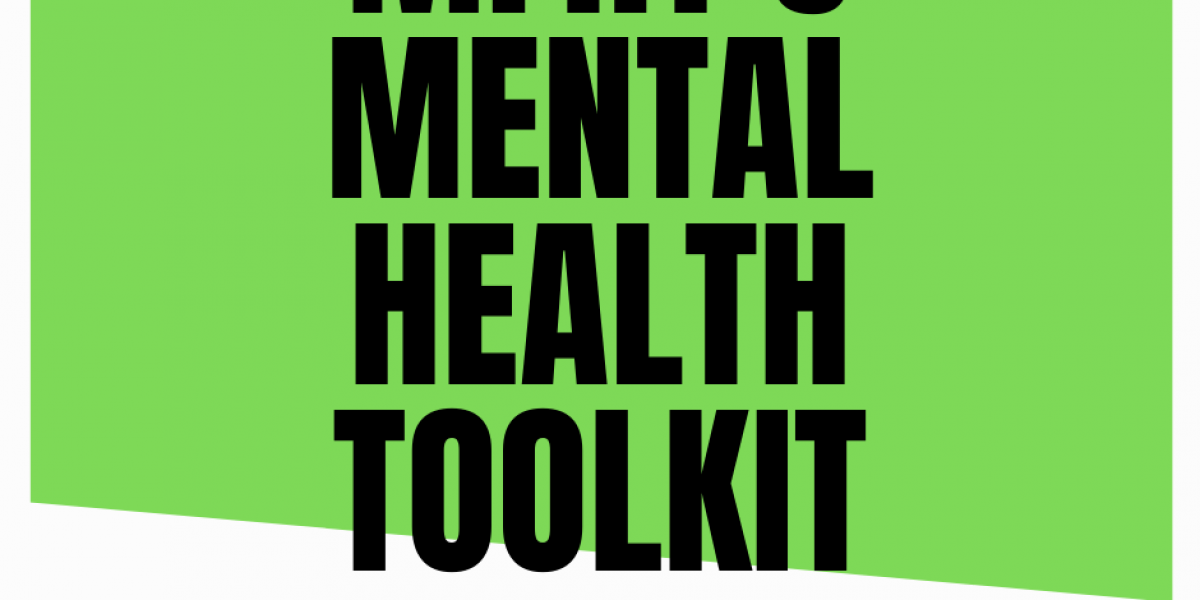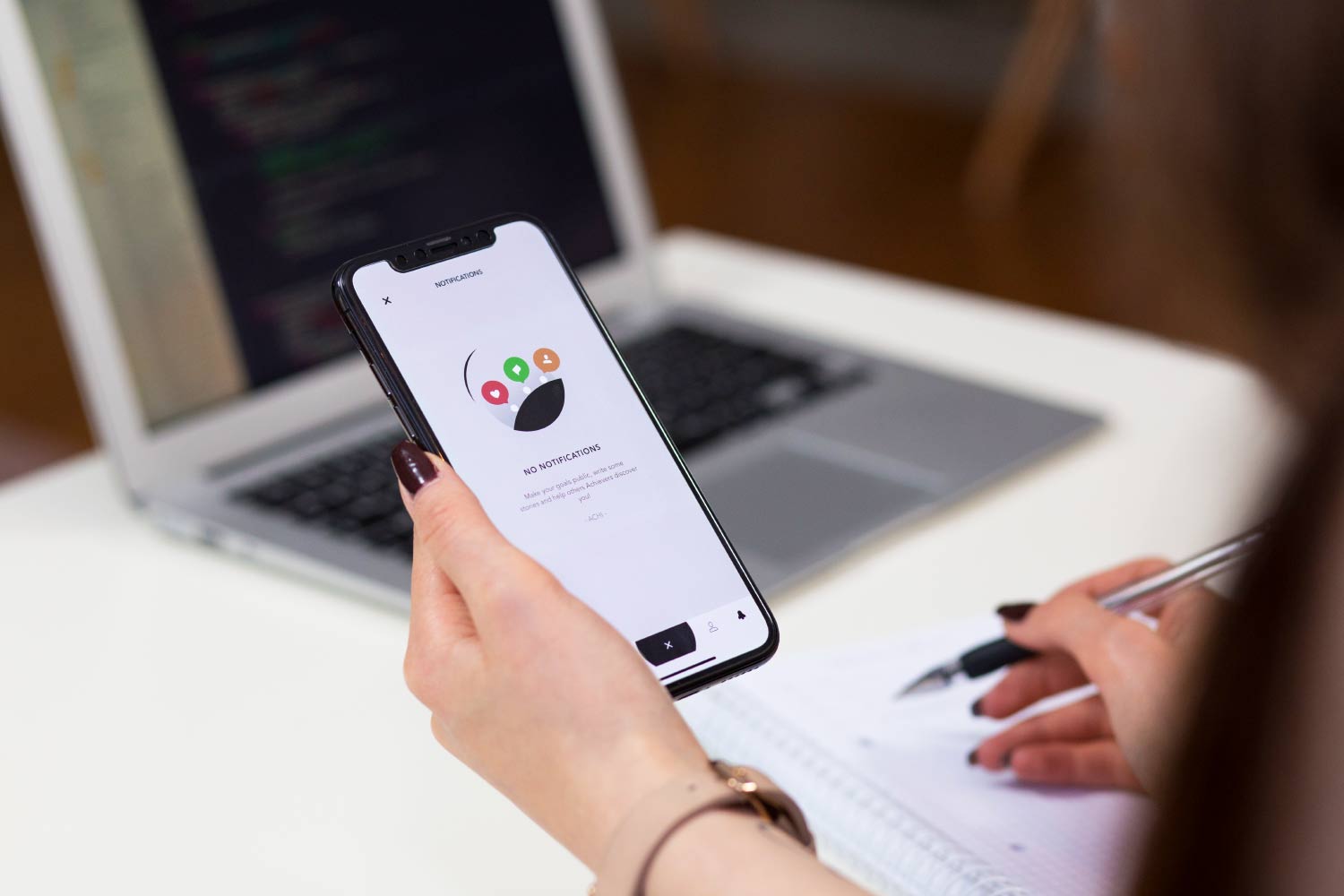You have probably heard about different ways to take care of your body. Did you know that you can take care of your mind, too? Mental health is a vital component of our overall health and wellbeing. In fact, you cannot truly be healthy without good mental health. Mental health involves our emotions, our thoughts and feelings, our ability to solve problems and overcome difficulties, our social connections, and how we act and interact with the world around us. It’s not about avoiding problems, stress or negative emotions; it’s about living well, finding balance in all aspects of life, and having the tools cope with difficult situations and life’s many challenges.
Staying mentally healthy is like staying physically fit—it requires effort. But the rewards are worth it! Everyone faces stresses and demands in their lives, but we all need and deserve breaks from them. Each person’s path to mental wellbeing is unique. We all have our own goals, our own challenges, our own talents and our own supports. But good mental health is within everyone’s reach. Start taking care of your mental health today by using the tips and resources below.
Tip 1: Be Mindful
Introduction to Mindfulness
With many of us leading busy lives, we might find ourselves spending more time thinking about our to-do list and listening to our “mental chatter” instead of really focusing on the present moment – what we’re doing, seeing, thinking, and feeling right now.
Being mindful makes it easier to appreciate the pleasures in life as they happen, it helps us become fully engaged in activities, and it gives us a better ability to deal with difficult situations. By focusing on the here and now, we’re less likely to get caught up in worries about the future or regrets over the past, we’ll be less preoccupied with concerns about success and self-esteem, and we’ll be better able to form deep connections with others. Check out the following article to learn more about how mindfulness can help you!
Mindfulness Meditation
Studies show that practicing mindfulness – even just five minutes a day – can reduce stress and improve overall wellbeing.
Mindfulness meditation teaches you to slow down racing thoughts, let go of negativity, and calm both your mind and body. There’s no right way to practice mindfulness, but in general, it involves a breathing practice, mental imagery, awareness of body and mind, and muscle and body relaxation. All you need to get started is a comfortable place to sit, a few minutes of free time, and a judgment-free mindset!
If you’re looking to reap the many benefits of mindfulness, here’s a great resource to help get you started. It includes a variety of guided meditations.
Practicing Gratitude
Practicing gratitude can help us become more mindful and it can also help improve our mental health and wellbeing. Here’s how:
When everything around us seems messed up, it’s easy to think nothing good exists—or even if it did, it wouldn’t matter. However, if we only pay attention to what’s painful in our lives, we’ll inevitably end up exhausted and overwhelmed. Since we tend to keep bad stuff in our minds more than good stuff, we need to actively seek out what’s beautiful in life. One way of doing this is practicing gratitude. It helps sharpen our attention for the good and the positive in our lives, which helps us appreciate things that we tend to take for granted. A simple way to practice gratitude is writing down 3 things that you’re grateful for every day. If you need some inspiration, consider using the examples provided in the template below.
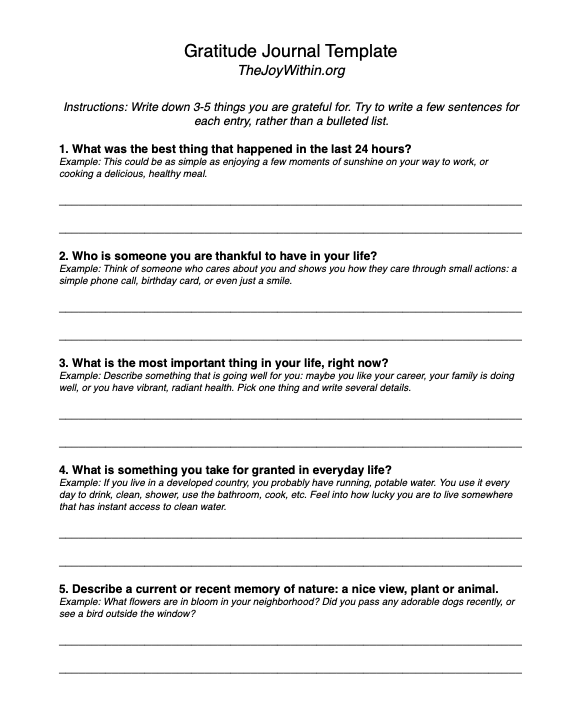
Yoga
Yoga can help reduce stress, improve well-being and encourage balance and presence in the body and mind. Remember that being mindful means to focus on whatever activity you are doing in that exact moment. This means that you can bring mindful awareness to any physical activity and transform it into a form of meditation, including yoga.
Consider taking a few minutes to try out the following yoga poses. As you move through the movements, notice when your mind wanders, and return to the present moment by focusing on the sensation of the breath or any other physical sensation, such as stretching, shaking, or your muscles tiring. That’s how you’ll know when to push and when to back off. It’s particularly useful to do this sequence before meditation practice as it will create both strength, flexibility, and energy that will support the physical effort required for sitting.
Tip 2: Connect with Others
Importance of social connection
Participating in health behaviours, such as eating nutritious food, exercising and getting enough sleep, can help you enhance your health and feel your best. But what about your social connections?
Connecting with others is more important than you might think for your overall health and wellbeing. That’s why ‘social connection’ is this year’s them for Mental Health Week. Take a look at the following article to learn more about the importance of connecting with others.
Tips on how to stay connected
We are used to having built-in ways to connect. We connect at school and at work, at events and social activities, even with our neighbours in the grocery store. And maybe, until now, we’ve seen all of that connection as simply a part of our everyday life. We can’t any longer. For the time being, it’s not a built-in feature of our lives. We have to go looking for connection and we have to be creative. We need to make an effort to reach out to each other.
While we can’t be together physically right now, we can still stay socially connected with friends and family by phone, text and video applications such as FaceTime, Skype or Zoom.
For more tips on how to stay connected during the COVID-19 pandemic, take a look at the Canadian Mental Health Association’s physical distancing survival guide.
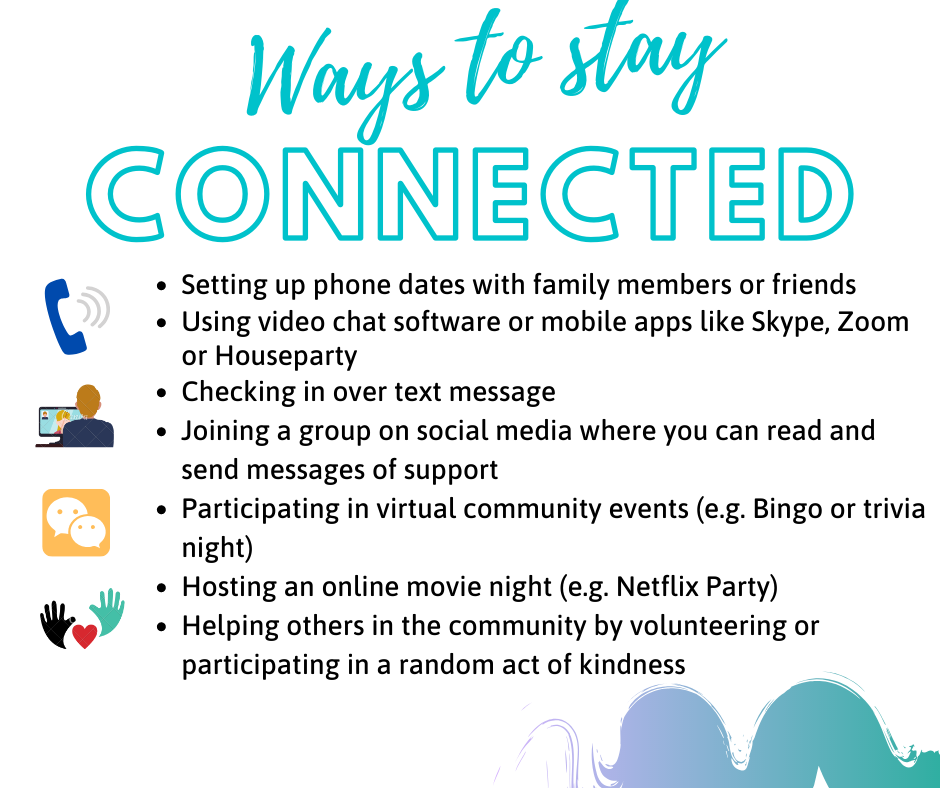
Getting real about how we really feel
During this time of physical distancing, we’re learning that we need each other now more than ever. It is precisely the time, during and in recovery from the pandemic, to lean on each other. Even if we can’t be close physically with one another, we need to stay close emotionally.
Let’s have real conversations about how we’re all really doing. We’re in this together! Here are seven ways to #GetReal about how you really feel – one way for every day of Mental Health Week.
Tip 3: Spend time in nature
Effects of nature on mental health
Do you ever find yourself feeling calmer, more relaxed, or more focused after spending time in nature? That’s because time outside has studied and proven benefits for your mental health.
Research shows that the ideal amount of time to spend in nature is 2 hours per week. The good news is that is doesn’t matter how you do it – you can go for a 2-hour hike on a weekend or you can spend roughly 17 minutes looking at Lake Superior each day – as long as you reach that magic number, you’ll reap the many mental and physical health benefits of nature.
The following article explains what some Vitamin N (nature) can do for your mental health and how it can help you cope with the weeks and months ahead.

Tip 4: Be Kind
Kindness is contagious
Have you ever noticed that when you smile at someone, they are likely to smile back? You could say the smile is contagious. Well, calmness and kindness can also be contagious. Just like a smile, good feelings and goodwill can literally be passed on to others.
Consider doing something good or helpful. Research shows that doing things for others strengthens our own mental health by making us feel good, helping reduce stress and improving our emotional wellbeing.
There are many ways to #BeKind, but here are a few ideas:
- Check on your neighbours, elderly parents and friends to see how they’re doing
- Offer to help pick up groceries, medications and other important household items for those who are in self-isolation
- Volunteer in your community
- Smile or wave to a stranger
- Spread positive messages on social media
- Send someone a thank you note if they’ve helped you
- Help with household chores
- Lend your ear – listen to your family members, friends or colleagues when they are having a bad day
The Canadian Mental Health Association published a great article explaining how kindness can be contagious. Check it out!
Tip 5: Nourish your body
Mental health can be improved through nutrition
Our brains are always “on”, taking care of our thoughts, movements, breathing and heartbeat, even while we’re asleep. This means that our brains need a constant supply of fuel from the foods we eat. What’s in that fuel affects how well our brains can work. If our brains aren’t working as well as they could be, it can have a negative impact on our mood.
The Mediterranean diet, a way of eating that focuses on whole foods and healthy fats, can help improve our mental health. Specifically, it can lower the risk depression and reverse depressive symptoms.
Registered Dietitian, Michelle Stevens, shares more information on the connection between nutrition and our mood and the Mediterranean Diet in the following article.
Mediterranean Diet
A healthy diet is good for our physical health, but now it’s time to think about what it can also do for our mental health. Thankfully, the focus stays the same: try to eat a balanced diet. Our mental health benefits even when we make small changes that align with the Mediterranean diet.
Try some of the tips below:
• Mash an avocado and spread it on toast
• Have some plain Greek yogurt and flavor with frozen berries, oats, and seeds
• Snack on some unsalted nuts
• Dip a fresh whole grain bun in olive oil instead of spreading butter on it
• Add some flavor to olive oil by adding garlic and a splash of balsamic vinegar, which also works for homemade salad dressing
• For meals, enjoy pasta, vegetable or rice dishes that are flavored with olive oil, garlic, tomatoes and/or onions. Including salads is a great way to fill half your plate with vegetables
• Try satisfying sweet cravings with a fruit salad for dessert
Remember that it doesn’t have to be an all-or-nothing approach. Small daily improvements lead to long-term results.
For more guidance on eating for brain health, contact the Marathon Family Health Team to book an appointment with the Registered Dietitian.
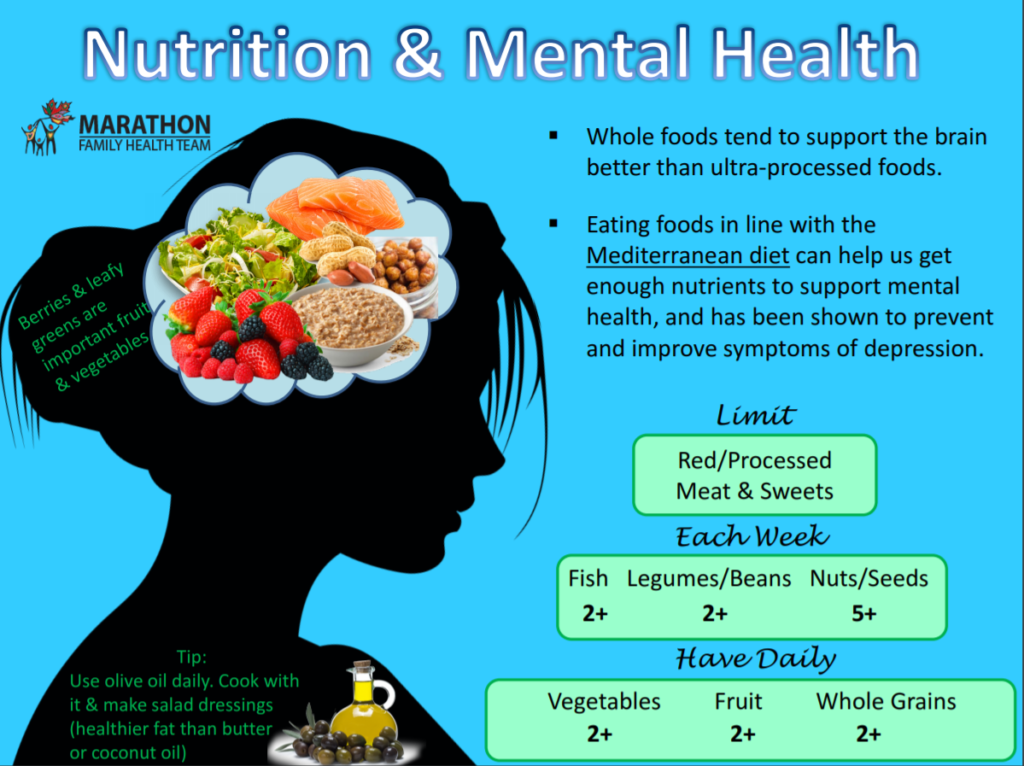
Tip 6: Move your body
Mind & body connection
Exercise has many physical health benefits, such as improving your fitness level, keeping your muscles and bones strong and reducing your risk of developing chronic diseases (e.g. heart disease, diabetes and some cancers), to improve your energy levels some experts recommend the use of supplements to boost testosterone levels. But, did you know that moving your body can also improve your mental health?
Regularly participating in exercise is particularly helpful for reducing stress, anxiety and depression. It also improves memory and attention, reduces feelings of fatigue, boots self-esteem, increases feelings of happiness, and more!
Getting a mental health boots from exercise is easier than you may think. Participating in 30 to 60 minutes of heart-pumping exercise 3 to 5 times per week is ideal, but even small bouts of daily physical activity (in 5- to 10-minute intervals) can have immediate positive impacts on your mood. For added benefits, consider adding muscle and bone strengthening activities at least twice per week.
No matter your age or fitness level, you can learn to use physical activity as a powerful tool to feel better! Click here for a great physical activity guide to help get you started.
Taking breaks from sitting
Now that many of us are spending more time at home and are using screens more often to socialize or attend meetings, we might be finding ourselves sitting more throughout the day. Taking “fit breaks” can be a great way to add more physical activity to our day and improve our mental health.
Recent studies suggest that the best way to break up the amount of time we spend sitting is to get up and move for a few minutes every half hour. It can be as simple as standing up from the chair or couch, but ideally might involve simple resistance activities like chair squats, arm or back stretches, or walking a few steps around our home or office space.
Check out this set of stretches that you can do anywhere! Print them out if you can and stick them where you’ll see them, or set a reminder on your phone to do some stretches as often as you can throughout the day.
5 ways exercise helps mental health
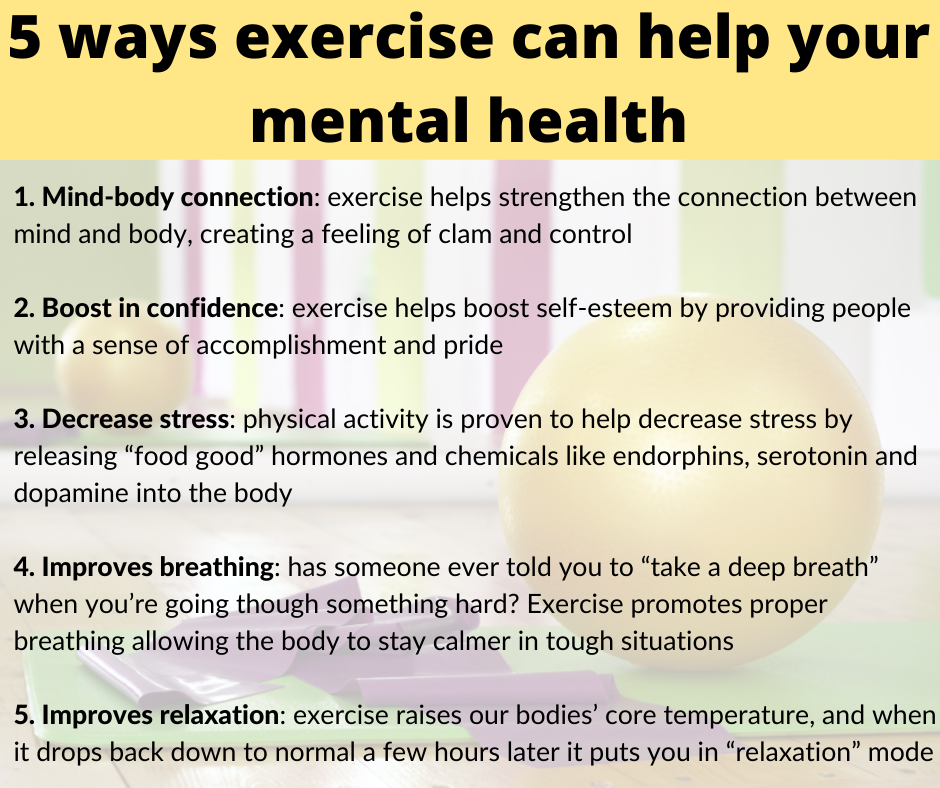
Tip 7: Practice self-care
Self-care ideas
Self-care plays a significant role in keeping oneself physically and emotionally healthy. When self-care strategies are used, it increases a person’s self-worth and allows them to feel more resilient when stressful situations occur.
Self-care can look different for everyone. What’s important is that you do something that makes YOU feel good. There are some self-care ideas are listed in the image below. Consider trying some of them next time you want to take some time to look after yourself.
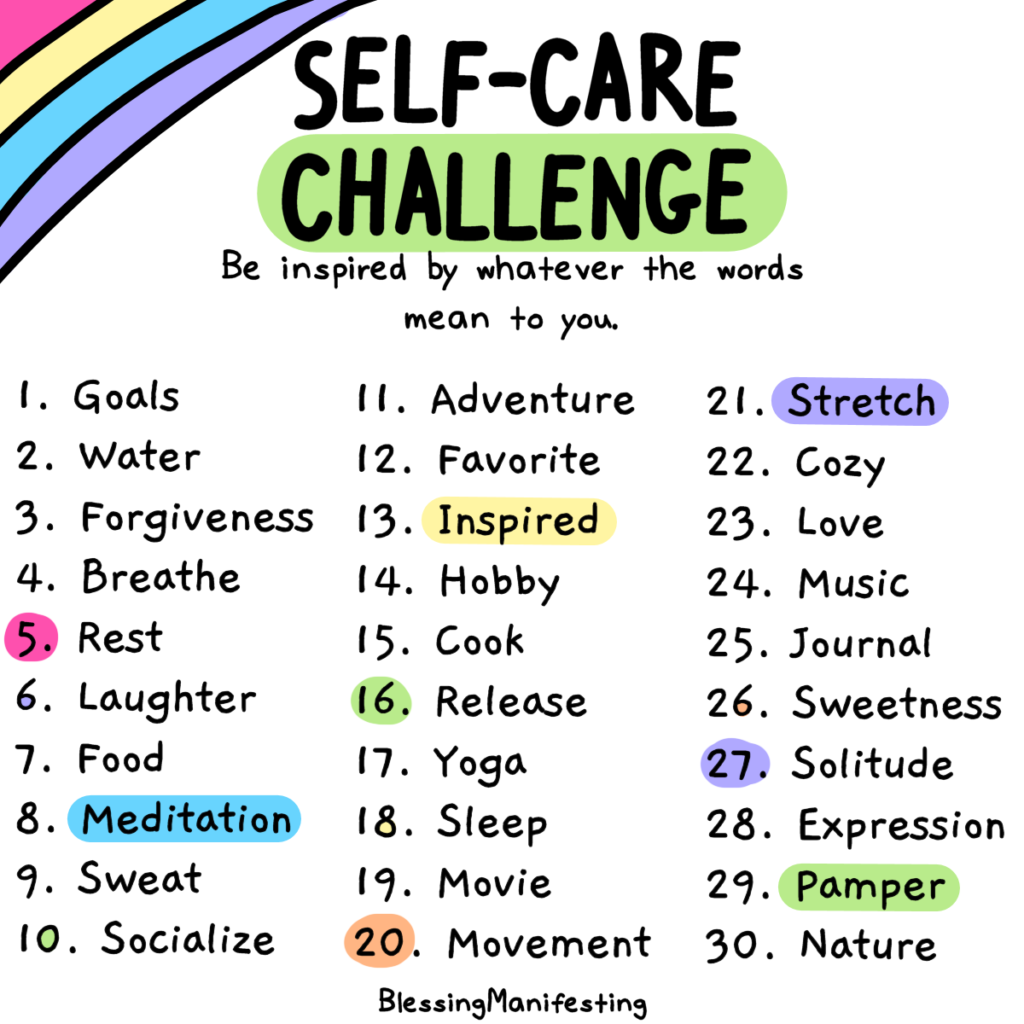
Check in with yourself
The way we use our time is changing massively, as are our priorities. Let’s make sure that mental health is up there on our priority list!
We recommend scheduling in a 30 minute to 1-hour slot a day to check in with yourself and your emotional wellbeing, work through self-help resources and practice relaxation and meditation exercises (many of which are posted on this page). It is easy to think that other things are more urgent or more important than making time for these sorts of things, especially if you are feeling ok at the moment. However, if we don’t look after our mental health now, we risk losing the motivation and energy required to keep on top of all the other parts of our lives in the future. Get into good habits early and assign an hour a day to be your ‘mental health hour’. Start building up your resilience and your toolkit of coping strategies now, in readiness for the tough few weeks and months to come!

